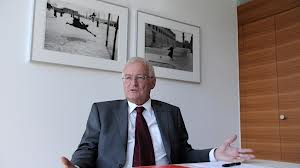By Andrew Warshaw
September 22 – Revelations that FIFA’s much-discussed report into possible corruption surrounding the 2018 and 2022 World Cup bid process might never be made public threatens to plunge the organisation into yet more discomfort and debate over morality.
Earlier this month, two of FIFA’s most respected vice-presidents – Jeffrey Webb who runs CONCACAF and Asia’s Prince Ali bin Al Hussein of Jordan – both declared that they would favour the 350-page report being published in order to show FIFA was serious about its reform process.
But according to the Sunday Times newspaper, the FIFA ethics judge dealing with the report, Hans Joachim Eckert, plans to keep the entire file secret.
The report was drawn up after two years of painstaking interviews and analysis by Michael Garcia, head of the investigatory arm of FIFA’s ethics committee, following the contests for 2018 and 2022 that were dogged by allegations of bribery and voting collusion. It was then passed to Eckert, who heads the adjudicatory arm of the committee and is the person responsible for recommending any sanctions.
The German judge at first announced he would reveal his findings against anyone guilty of wrongdoing in November, only to then postpone that date, according to reports, to the spring of 2015. His verdicts will be limited to individuals which will almost certainly rule out any chance of a revote of either the 2018 or the 2022 ballot.
Eckert insisted at an Ethics in Sport conference last week that no-one at FIFA had read the confidential report and that only four people had seen the files – himself, Garcia, and their deputies, Australian judge Alan Sullivan and Swiss prosecutor Cornel Borbely.
And according to the Sunday Times, he wants to keep it that way for good, telling the paper: “You cannot expect anything to be disclosed from this report.”
That would also appear to conflict with the views Garcia who, at the same conference last week, was quoted as complaining about the body’s secrecy rules that keep his reports sealed. “I think that is a disservice in many ways because people are skeptical and want information,” Garcia was quoted as saying.
“There may be issues as to what particulars can be public and confidential information – as we have with all law enforcement cases and issues – but, as a general matter, I think that the more that is public and the more that people can see what is done and agree with what was done – or disagree with what is done – then those issues can be resolved and the organisation can move on,” Garcia was further quoted on the sidelines of the conference.
Contact the writer of this story at moc.l1744470144labto1744470144ofdlr1744470144owedi1744470144sni@w1744470144ahsra1744470144w.wer1744470144dna1744470144

